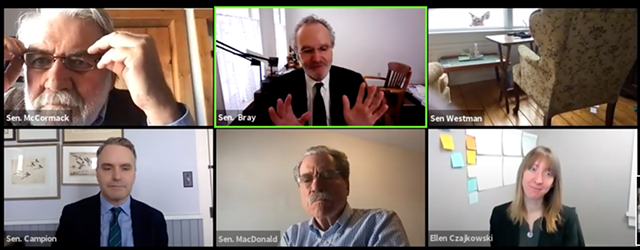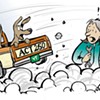Friday, January 29, 2021
Environment / Statehouse
Senate Committee Votes to Reject Scott's Act 250 Executive Order
click to enlarge 
- Screenshot ©️ Seven Days
- Senate Natural Resources and Energy Committee
Updated 3:35 p.m.
A Senate committee voted unanimously Friday to reject Gov. Phil Scott’s executive order to reform the administration of Act 250 following scathing testimony from one witness about the governor's motives.
Scott’s January 14 order sought to streamline the administration of the land-use law by creating a statewide board to decide major projects, taking the place of the nine district commissions that do so now.
The Senate Natural Resources & Energy Committee voted 5-0 to block the order, setting up a vote by the full Senate next week.
Sen. Mark MacDonald (D-Orange) said he was surprised the Scott administration had pushed to reform the law through executive fiat, lamenting the governor’s “take or leave it” approach.
“I would vote to leave it, and hope that the next time the governor proposes an executive order it’s because a consensus has been reached,” MacDonald said.
Scott's spokesperson, Jason Maulucci, asked how many
witnesses who support the governor's order had been invited to testify.
"The Administration's position on the Governor's initiative itself is that we appreciate the Legislature's willingness to continue this important discussion and we hope to convince them of the merits of the proposal," Maulucci said in a statement.
The Senate committee passed a resolution that presumes only one chamber of the General Assembly needs to reject the order to block it, which is a point of legal contention. Scott claims rejection by both chambers of the General Assembly would be required to block his order, though that’s not how state law reads.
He argues the state law unconstitutionally limits his executive authority and federal caselaw backs him up. The Senate resolution sidesteps that constitutional argument.
Even Sen. Richard Westman (R-Lamoille) voted to reject his fellow Republican's executive order. He stressed that he hoped lawmakers would solicit a wider range of testimony on Act 250 in the future.
“There are a lot of people who would like to testify on this issue,” Westman said, “way beyond the number that we have had in.”
The highlight of the morning’s testimony was Ed Stanak, a Barre Progressive and longtime Act 250 district coordinator, who said Scott’s reform efforts were misguided. He noted that Scott’s objections to the law stem from Scott's attempt to open a motorcycle shop in Morrisville 40 years ago.
“Scott claims that unreasonable delays in obtaining an Act 250 permit subsequently forced him to abandon his business proposal, and he has been hellbent on reforming Act 250 ever since,” Stanak said.
In fact, the record from 1983 shows Scott’s development partner started construction without permits, never completed the Act 250 review and withdrew the application four years later. Scott has since used this “tale of woe” in stump speeches and has publicly said the failed project changed his life, Stanak testified.
“The misplaced bitterness of a young businessman became a pillar upon which a political career has been built, and continues to this day,” Stanak said.
Scott's executive order would destroy the time-tested Act 250 district commission process through “brazen political power” based on Scott’s “imagined understanding of the Act 250 process."
Scott has argued that a more professional, consolidated permit process would provide developers with a more predictable, less expensive and protracted review process that still protects the environment.
Julie Moore, the secretary of the Agency of Natural Resources and the administration’s chief advocate for Act 250 reform, said she was disappointed by the committee’s action.
“The remote environment we are all working in is clearly challenging, and made harder when legislative committees are unable to provide a complete picture of their days’ planned work,” Moore said.
She declined to comment on Stanak's charaterizations.
Sen. Chris Bray (D-Addison), said while Stanak’s "personal interpretations" of the governor's thinking made him “a little uncomfortable,” he praised his committee for “handling a sensitive matter with finesse.”
Tags: Act 250, Phil Scott, executive order, Senate, Web Only, Image
About The Author

Kevin McCallum
Bio:
Kevin McCallum is a political reporter at Seven Days, covering the Statehouse and state government. He previously was a reporter at The Press Democrat in Santa Rosa, Calif.






















































